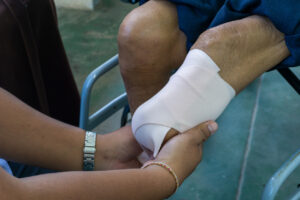
Few injuries are as life-changing and emotionally devastating as an amputation. Whether you have lost a limb during a severe accident or due to a doctor’s decision to operate, your life has been forever altered by the trauma of your catastrophic injury.
Research shows that there are approximately two million people in the United States living with an amputation, with 185,000 amputations occurring every year in the country. If you have suffered loss of limb, know that you are not alone. If your amputation was caused by a person or group’s negligence or recklessness, know that you have legal options for recovery and justice.
The amputation attorneys at Alpert Schreyer Injury Accident Lawyers have dedicated their careers to helping victims cope with their losses by finding fair and full compensation from those that caused the injury. Contact us at (301) 932-9997 to schedule a free consultation.
What Complications Come With Amputations?

While serious accidents, like car crashes or on-the-job incidents, can severe limbs, most amputations are a part of a medical procedure that is a last resort when a limb is beyond saving. Shattered bones and severe infections that cannot be cured with medical treatment may mean that a limb must be amputated to prevent the trauma from becoming fatal.
However, while these medical procedures are done to prevent major side effects, there are still many difficulties that arise afterward.
Losing a single arm or leg can severely impair the physical capabilities of a survivor. Losing more than one limb can cause even more difficulties, since the effects are even more widespread. Often, victims will have to cope with emotional and mental trauma from loss of limb, which can have major effects on personal and professional life. Additionally, many victims will be unable to perform the duties that are essential to their jobs. Phantom pain is also commonly experienced after an amputation, leading to further physical and mental trauma.
Combining an inability to work with emotional trauma and costly medical bills from amputation procedures means that you and your family may be facing serious challenges in all areas of life. But there is still hope for recovery.
How Can I Recover From an Amputation?
Recovering from an amputation is all about rehabilitation and finding the right medical equipment for your needs. Just as amputation procedures have advanced over the years, so have rehabilitation and prosthetics.
Rehabilitation is a necessity for coping with your losses emotionally and mentally, as well as adapting to the challenges posed by losing a limb. Rehabilitative care changes from person to person, depending on the type of trauma and the difficulties it poses. Trained caregivers can help you improve strength, coordination, endurance, and flexibility in the wake of an amputation.
They can also help you decrease the pain you are experiencing and care for your wounds. Altogether, rehabilitation is meant to get you back to a high quality of life.
Today, prosthetics range from simple split-hook systems for hands and shanks for legs to articulated, motorized prosthesis that can perform complicated actions. Knowing what is right for you takes time, but can make all the difference in your recovery.
Additionally, rehabilitation will help you learn to use your prosthetics to their full capabilities and in whatever environment you need them for, whether that is personally or professionally. These services may be expensive, but successful claims against the people who caused your amputation will pay for what you absolutely need in your recovery process.
Recovery with the Help of Experienced Attorneys
If you have suffered injuries that led to an amputation, you may not know where to turn in your efforts to recover. Call the Maryland personal injury attorneys at Alpert Schreyer Injury Accident Lawyers at 301-936-0042 and receive a no-cost consultation about your injuries, the incident that caused your amputation, and how you can hold at-fault parties responsible for your loss.
With our help, you can return to a fulfilling life that is not tied down by your amputation.


